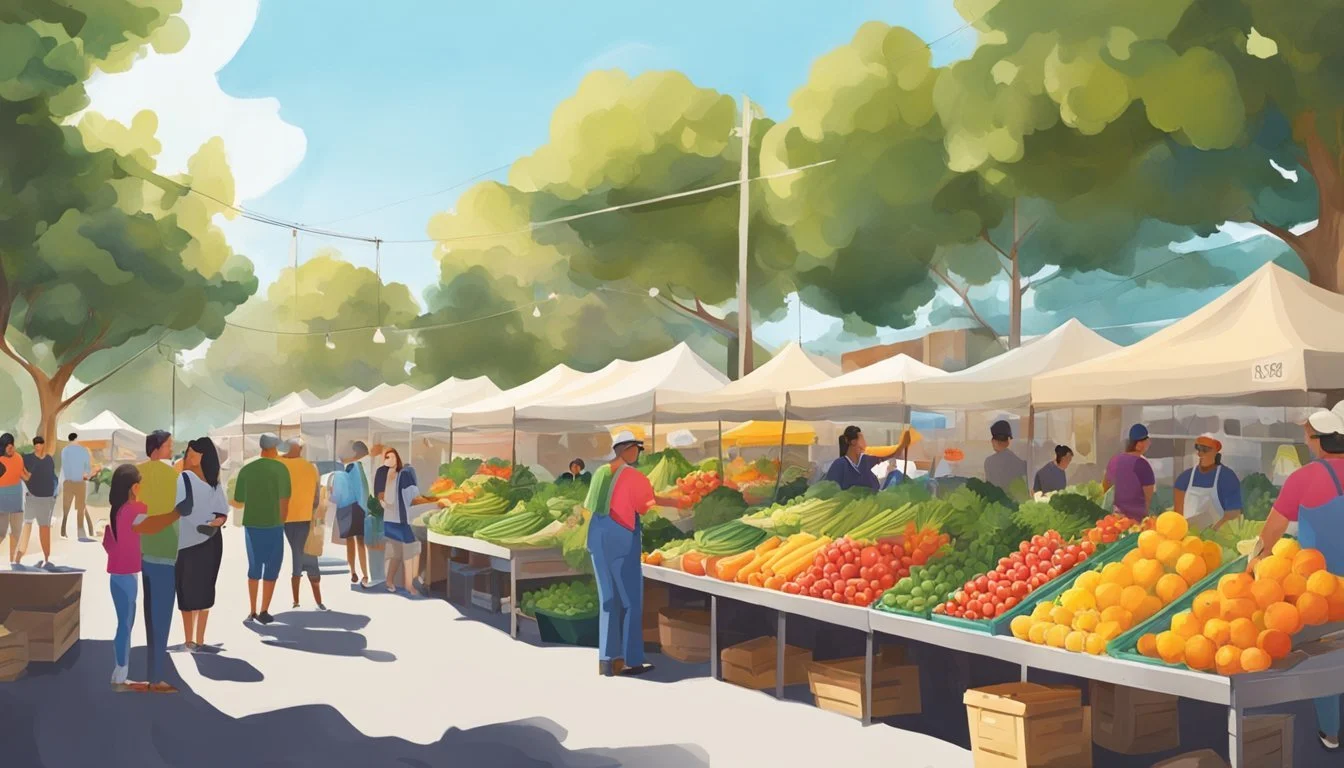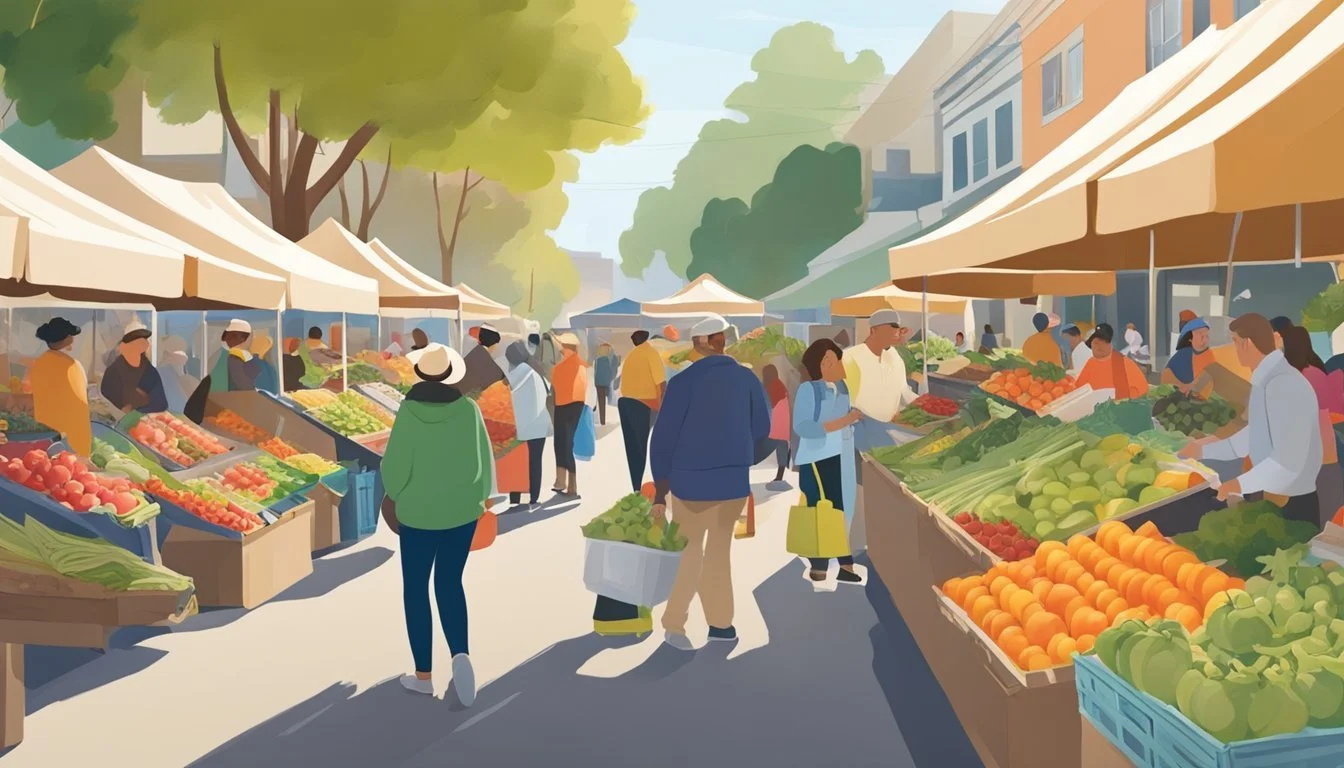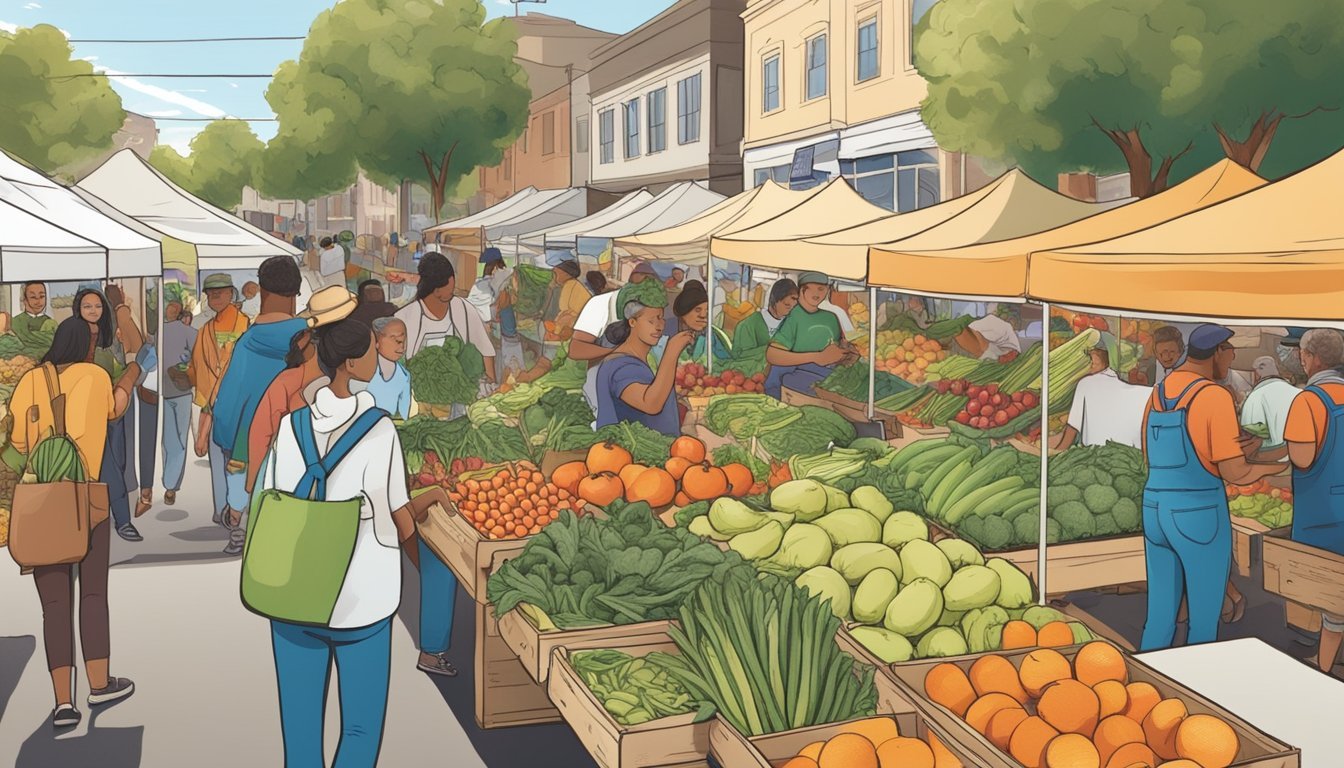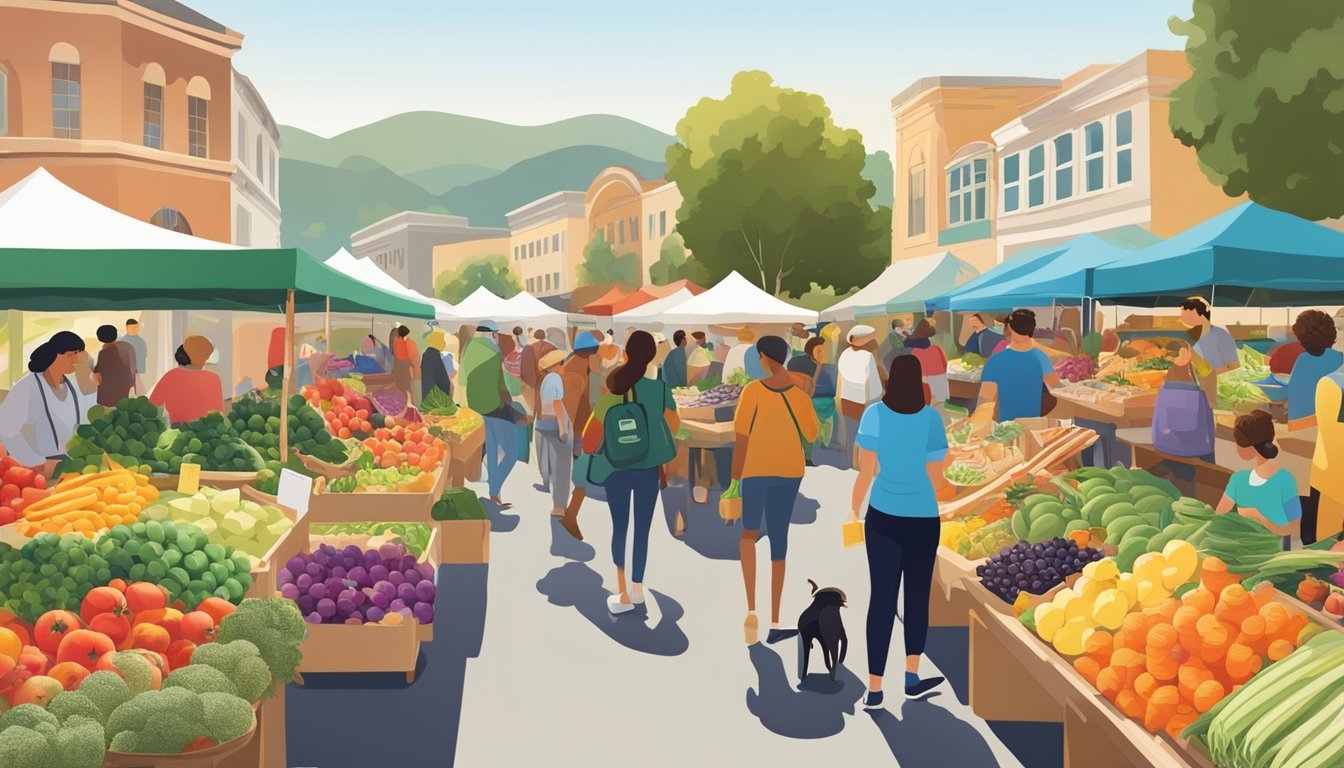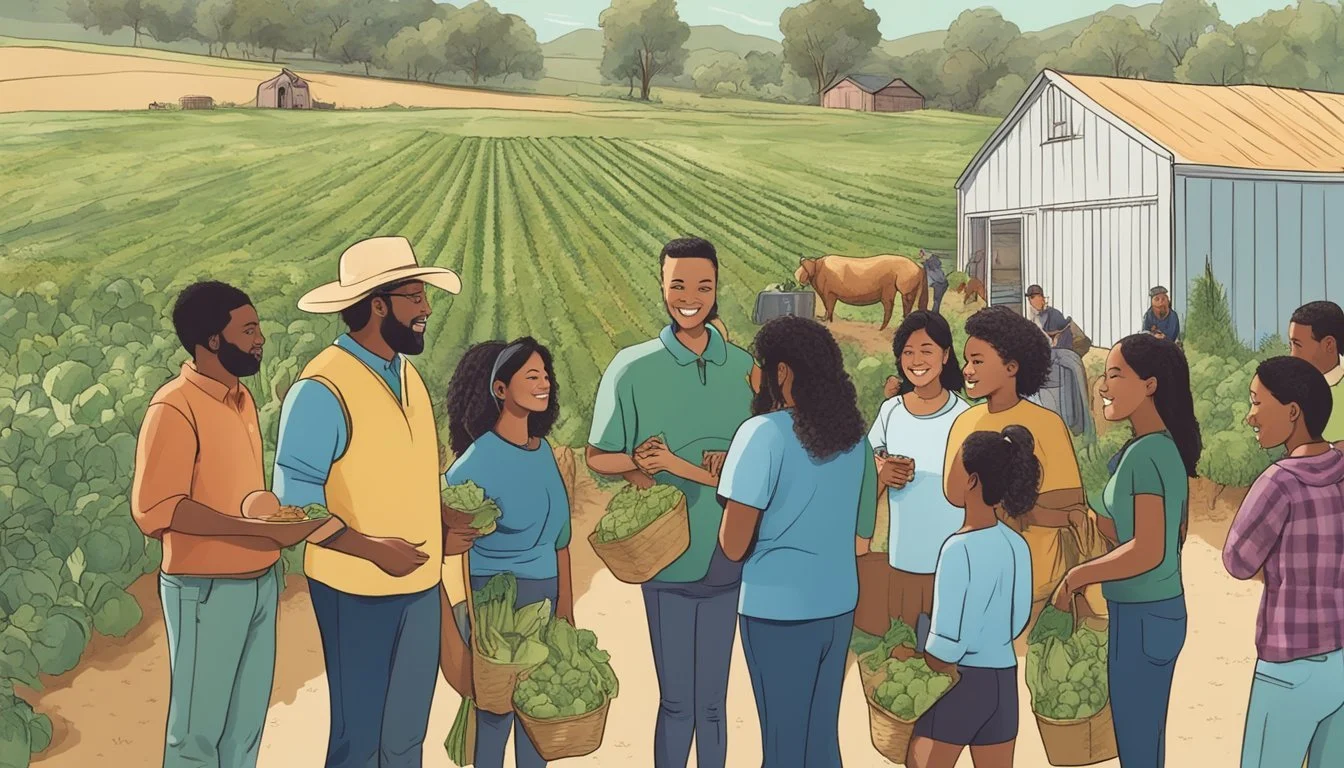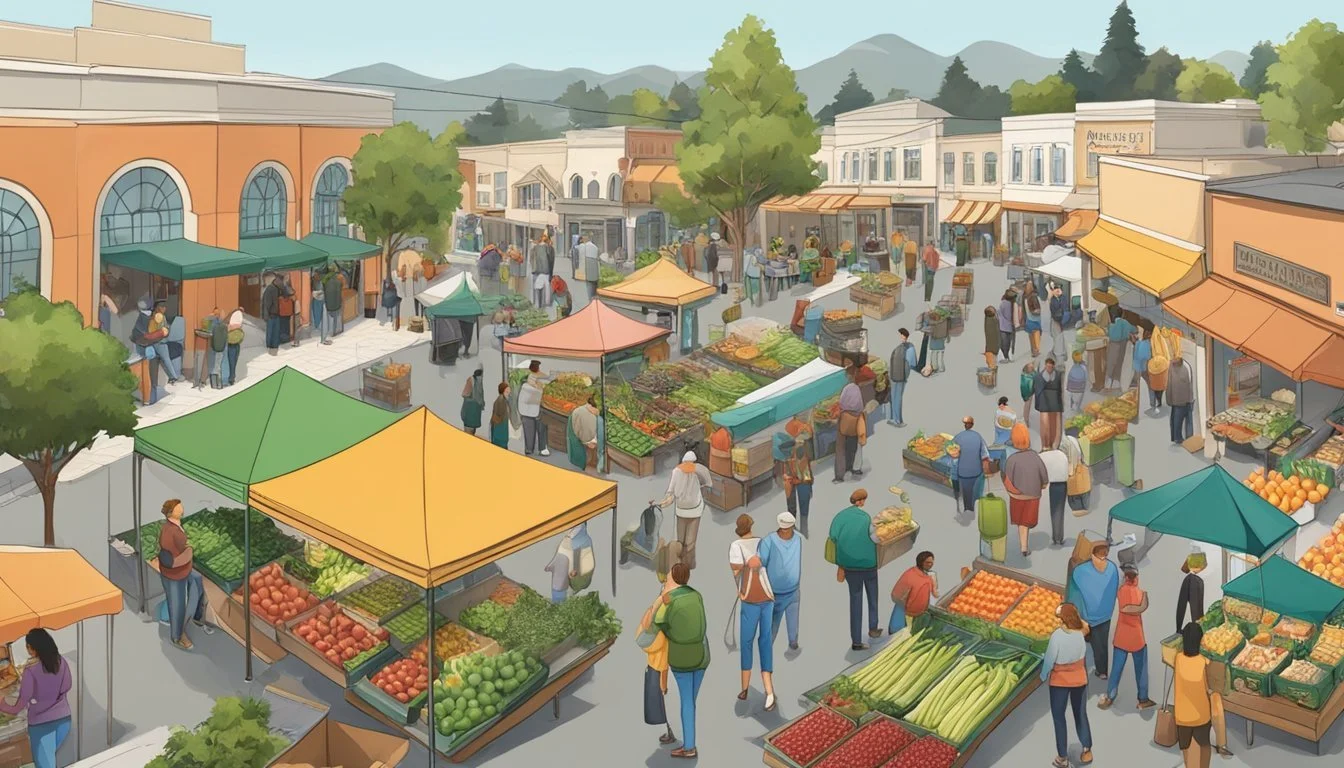Community Supported Agriculture (CSA) in San Mateo, CA
A Guide to Local Produce Subscriptions
Community Supported Agriculture (CSA) represents a growing movement within the San Mateo, California area that connects local farmers directly with consumers. In this model, members of the community buy shares or subscriptions from local farms, which in return provides them with a portion of the harvest throughout the farming season. This not only fosters a closer connection between residents and the food they consume, but it also supports local agriculture and helps stabilize the farm's revenue stream.
San Mateo County boasts a variety of CSA operations, delivering fresh, locally-grown produce to subscribers. These programs often provide a diverse array of fruits and vegetables, sometimes including additional farm products. By participating in a CSA, residents in San Mateo are able to enjoy fresh, organic produce sourced from nearby farms, such as Live Earth Farm, while contributing to the sustainability and resilience of the local food system.
The CSA model in San Mateo is characterized by its adaptability and community engagement. Farmers adapt to the needs and preferences of their members and often provide flexibility in terms of share sizes and pickup locations. Many farms offer seasonal sessions that cover different parts of the harvest calendar, ensuring that members receive a wide assortment of produce across the year. Collectively, these CSA programs contribute significantly to maintaining San Mateo's agricultural legacy and enhancing the vitality of its local communities.
Understanding Community Supported Agriculture
Community Supported Agriculture (CSA) has evolved as an integral model that promotes the purchase of local food directly from farmers, enhancing both the health of consumers and the sustainability of agricultural communities like those in San Mateo, CA.
History of CSA
CSA originated in the 1960s in Germany, Switzerland, and Japan as a response to concerns about food safety and the urbanization of agricultural land. The concept was established in the United States in the 1980s. In San Mateo, CSA enables residents to subscribe to the harvest of a local farm or group of farms, fostering a beneficial partnership between producers and consumers.
Principles and Practices
CSA is grounded in principles of agroecology and sustainable agriculture. Members buy a "share" of the farm's production and in return receive a weekly or bi-weekly delivery or pickup of farm products. This model creates a direct support system for farmers and allows them to focus on earth-friendly farm practices.
Local food: Encourages consumption of seasonal products
Organic farms: Often employ organic or integrated pest management strategies
Member involvement: Shareholders sometimes participate in farming activities
Benefits of CSA to Consumers and Farmers
The benefits of CSA are multifaceted, impacting health, community, and the local economy. Consumers gain access to fresh, nutritious farm products and establish a connection to the land and people who grow their food. For farmers, CSA offers financial stability and reduces marketing costs.
Community: Strengthens the ties between individuals and local farmers
Health: Enhances diet through access to fresh produce
Local economy: Investment in CSA circulates money within the community, benefiting the overall economic health
In San Mateo, where the agricultural production value was significant, CSA contributes to preserving valuable agricultural land and promoting a resilient local food system.
CSAs in San Mateo County
Community Supported Agriculture (CSA) programs in San Mateo County connect consumers directly to locally sourced, fresh, and often organic produce from small farms. These programs support the county’s dedication to sustainable agriculture and help bolster the local economy.
List of Active CSAs
Live Earth Farm: Located in the Santa Cruz Mountains offering a variety of organic produce.
Fifth Crow Farm: Based in Pescadero, known for its diversified, certified organic products.
Blue House Farm: Also situated in Pescadero, featuring organic fruits and vegetables.
Farm Fresh to You: Serving the Bay Area with organic produce from Capay Valley.
Each CSA offers seasonal subscriptions where members receive regular deliveries of farm products, fostering a connection between farmers and the community.
Spotlight: Local Success Stories
Live Earth Farm stands out as a modest-sized, family-owned organic farm established in 1995. This CSA has become a pillar in the community, promoting sustainable farming practices in the foothills of the Santa Cruz Mountains and providing organic produce to the local San Mateo and San Francisco Bay Area communities.
Fifth Crow Farm, founded by three partners in Pescadero, represents another success story. Their commitment to organic farming and community engagement epitomizes the values central to San Mateo County's agricultural scene. By practicing water conservation and supporting soil integrity, they not only maintain but enhance the land's productivity, benefiting future generations.
Starting a CSA in San Mateo
For farmers and growers in San Mateo interested in connecting directly with their community, starting a Community Supported Agriculture (CSA) initiative can be a sustainable business choice. The following subsections address the crucial elements of business planning, adherence to land use and environmental regulations, and strategies for community engagement essential for a successful CSA operation.
Business Planning and Marketing
Before launching a CSA in San Mateo, clear business planning is paramount. Farmers must calculate initial costs, set suitable subscription prices, and account for a profit margin that keeps the business viable. For instance, after factoring in total costs and a small profit, a farmer could establish a set number of shares at a balanced price point. Marketing plays a critical role, utilizing tools like social media, local farmers markets, and direct marketing to raise awareness of the CSA.
A strategic plan could entail the following:
Cost Analysis: Identify expenses and decide on a fiscal goal.
Price Setting: Use data to determine share prices (e.g., costs plus profit margin divided by the number of shares).
Marketing Channels: Utilize direct marketing methods through various channels like online platforms and community outreaches.
Land Use and Environmental Regulations
San Mateo's agricultural land requires careful consideration of land use policies and environmental regulations. Prospective CSA operators must acquire the correct zoning permits for agricultural land use. Compliance with these regulations not only protects San Mateo's native habitats but also garners community trust in the CSA's sustainable practices. It is advisable for each CSA to conduct an environmental impact assessment to mitigate any potential negative effects on the land.
Key requirements include:
Zoning Permits: Check with San Mateo's zoning department to ensure the land is zoned for agricultural use.
Environmental Impact: Assess and implement strategies to minimize ecological disruptions.
Community Engagement and Membership Growth
Growing a CSA in San Mateo hinges on robust community engagement. Building a membership base requires effective communication about the benefits of joining a CSA, such as receiving fresh, local produce. Establishing a relationship with the community through open dialogue can foster transparency and trust. Moreover, hosting community events or farm visits can draw interest and boost CSA memberships.
Engagement strategies include:
Direct Outreach: Organize meet-ups or attend community events to promote the CSA.
Membership Advantages: Clearly communicate the benefits of fresh, local, and sustainable produce to potential members.
Open Farm Days: Provide opportunities for community members to visit and learn about the farming operations.
Farming Techniques and Sustainability
Community Supported Agriculture (CSA) in San Mateo, CA, reflects a commitment to sustainable farming techniques that are both environmentally friendly and supportive of local ecosystems. Utilizing organic and diversified farming methods, these farms emphatically prioritize water conservation and soil health while strategically integrating livestock and crops to enrich agricultural biodiversity and resilience.
Organic and Diversified Farming
In San Mateo County, organic farms implement sustainable practices that exclude synthetic pesticides and fertilizers, thereby maintaining soil integrity and supporting various ecosystems. Organic farming is complemented by diversified farming techniques, which include rotating crops to manage nutrients effectively and minimize pests naturally. Farms practice agroecology, blending agriculture with ecological principles to promote biodiversity and sustainability.
Water Conservation and Soil Health
Agriculture in San Mateo places a significant emphasis on water conservation and enhancing soil health. Innovative irrigation techniques that minimize water waste are common, and mulching is utilized to preserve soil moisture. Farms in the region also focus on maintaining soil fertility through natural means, such as composting, which increases organic matter and beneficial microorganisms in the soil.
Integrating Livestock and Crops
Integrated farming systems showcase the combination of livestock management with crop production. This approach creates a synergistic relationship where livestock provide natural fertilizer for crops through manure, while grazing patterns can aid in controlling weeds and improving soil structure. Additionally, such integration aids in nutrient cycling, with nitrogen and phosphorous from manure serving as critical inputs for healthy crop growth.
Economic and Social Impact
Community Supported Agriculture in San Mateo County contributes significantly to the local food economy while addressing food security and enriching the community through cultural and educational outreach.
Local Food Economy
San Mateo County has recognized that for every dollar generated in agricultural production, there is a $1.60 to $3.50 increase in economic activity. Local CSAs play a crucial role in this by selling direct to consumers, which keeps money circulating within the community. There are 16 CSA operations within the county, further solidifying the county’s commitment to strengthen the local economy through agriculture.
Food Security and Access
CSAs contribute to food security by providing fresh, nutritious produce to local residents. These operations often support various payment methods, including SNAP and EBT, broadening food access to different income levels. The presence of CSAs and food hubs ensures that people can access healthy farm products, which is essential for the community's overall health.
Cultural and Educational Outreach
Education and community engagement are at the heart of CSA initiatives in San Mateo. Agricultural education is provided through CSA memberships and public programmes, fostering a connection between the community and food production. This educates the community on the benefits of sustainable agriculture and the importance of supporting local food systems, promoting ongoing community engagement.
Challenges and Opportunities
Community Supported Agriculture (CSA) in San Mateo confronts obstacles and embraces prospects, particularly in market dynamics, climate resilience, and networking. These aspects are crucial for the long-term sustainability and growth of CSAs.
Navigating Market Fluctuations
CSA models in San Mateo County are not immune to market risks. Traditional wholesalers and retailers face market fluctuations that can impact the stability of CSAs. CSA managers must remain vigilant and adaptable to sustain their markets. Partnering with local businesses for community engagement and securing loyal customer bases are strategies that help mitigate these risks and maintain economic viability.
Adaptation to Climatic Stress
The agriculture sector, including CSAs, is subject to the whims of weather patterns. Climatic stress can lead to crop failures or reduced yields. However, CSAs have an opportunity to pioneer resilient farming techniques. By implementing water conservation measures and supporting soil integrity, San Mateo CSAs can not only adapt to changing climates but also contribute positively to environmental sustainability.
Innovation and CSA Networks
The CSA Innovation Network facilitates collaboration among CSA farms. Through networking, they share knowledge and resources, which bolsters individual and collective resilience. Embracing innovation in farming practices can open new opportunities for CSAs, such as adopting new technologies or diversifying crop selections. Such advancements can position CSAs in San Mateo to meet the growing need for fresh, locally-sourced produce.
Regulatory Environment and Support
Community Supported Agriculture (CSA) in San Mateo, California operates within a structured regulatory environment that is aimed at sustainability and the promotion of local organic farming. The government provides various incentives and there are important legal considerations for those managing CSA operations.
Government Policies and Incentives
The county government's commitment to protecting agriculture, the residents, and the natural resources is reflected in its policies and incentives. San Mateo County Department of Agriculture plays a pivotal role in this, as it not only regulates but also provides support through different programs. Examples of such support include:
Economic incentives: These are designed to bolster the economic viability of local farms, taking into account the multiplier effect of local farm production on the economy.
Water conservation: Initiatives encourage practices that make efficient use of water, a critical resource in agriculture.
Soil integrity support: Policies are in place to aid in the support of soil health, ensuring that farming practices contribute to long-term sustainability.
Government incentives are critical to the financial and environmental stability of CSAs, setting a foundation for their continued growth.
Legal Considerations for CSA Managers
Legal considerations are paramount for those managing CSAs. CSA managers have to navigate a range of legal aspects, from contracts with consumers to adherence to county and state agricultural regulations. Key legal points include:
Membership agreements: Clear and concise contracts with CSA members detail the sharing of risks and rewards of the farm produce seasonally.
Regulatory compliance: CSA managers must comply with San Mateo County's agricultural regulations, which may pertain to pesticide use and zoning laws.
Food safety: Managers should also stay informed of and comply with federal, state, and local food safety regulations to ensure that the products meet safety standards.
Through a thorough understanding of these legal frameworks, CSA managers in San Mateo can protect both their business interests and their members' wellbeing.
Future of CSA in the San Francisco Bay Area
Community Supported Agriculture (CSA) in the San Francisco Bay Area is poised for growth, leveraging strong community interest in sustainable and local food sources. The future of CSA indicates a stronger connection between consumers and local farmers, underscoring the demand for organic, seasonal produce that supports the regional economy.
Consumer Preferences and Market Trends
Consumer awareness of food origins and environmental impact has been rising.
There is an apparent trend towards plant-based diets and organic foods.
The preference for farm-to-door delivery services has surged.
Agricultural Innovations
Adoption of technology and data analytics is helping farmers with crop planning and distribution.
Water-saving practices and renewable energy are likely to become standard in CSA operations.
Community Engagement and Education
Educational initiatives by CSAs are likely to increase, with more workshops on sustainable farming.
CSAs may see more volunteer participation from local communities, enhancing the bond between urban dwellers and agricultural practices.
Environmental Impact
CSAs are anticipated to play a role in reducing carbon footprints by minimizing food miles.
The emphasis on local produce is in line with the Bay Area's commitment to environmental stewardship.
San Mateo and neighboring counties can expect to benefit from these developments, as the whole region has a history of valuing green initiatives and local enterprises. The future of CSA in the Bay Area reflects a commitment to health, community, and sustainability.
Conclusion
Community Supported Agriculture (CSA) has taken root in San Mateo County, reflecting a growing trend towards sustainable agriculture practices. These CSA operations play a significant role in connecting consumers with the sources of their food, while supporting local farmers and the regional economy.
The county benefits from a notable diversity of agricultural products including nursery items, fruits, vegetables, meat, and dairy. This diversity suggests a robust potential for CSA programs to offer a wide range of locally grown produce to their members. In recent years, 16 CSA operations have been delivering within San Mateo, indicating a strong community engagement and a demand for fresh, locally-sourced products.
For consumers looking to join a CSA, the benefits include fresh, seasonal produce and a direct relationship with growers. CSA members commonly share in the risk and reward of crop production, which fosters a sense of investment in local agriculture.
Looking forward, CSA operations in San Mateo hold promise for expanding their impact on local food systems. They serve as a model for sustainability, community engagement, and economic viability in agriculture.
Recommendations for future prospects include:
Exploring partnerships with local businesses and schools to further embed CSAs into the community fabric.
Utilizing technology to streamline distribution and connect with a broader consumer base.
Encouraging educational programs to inform residents about the benefits of participating in CSA programs.
The vitality of San Mateo's CSA operations epitomizes an innovative path for food consumption and production, one that is anticipated to adapt and grow with the community's evolving needs.

